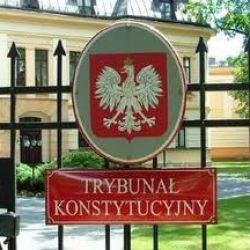The Tribunal’s view is that penal sanctions are disproportionate and as such they infringe on the freedom of expression.
The complaint was filed with the Tribunal by Wojciech S., ex-councillor of the Chojna commune, who had been issuing a brochure ‘Bez cenzury – Niezależny Biuletyn Informacyjny’ (‘Without Censorship – Independent Information Bulletin’). The brochure contained voters’ questions and his answers to those questions. After the offence under Article 45 of the Press Act, allegedly committed by S., had been reported, Wojciech S. was found guilty by the criminal court but the proceedings pending against him were conditionally discontinued for a two-year probation period. The court also ordered S. to pay PLN 300 for a designated public interest organisation. As a result of the judgement, Wojciech S. has lost his councillor’s mandate.
In justifying its decision, the Constitutional Tribunal focused on how the criminal liability for the absence of registration might affect the freedom of speech. The Tribunal held that in this case criminal sanctions were unduly severe and ‘unjustified in light of the values which they are to protect and objectives of the legislator’. It took note of the serious inconvenience suffered by the defendant as a result of the proceedings, the inflicted penalty and some additional disadvantages caused by the guilty verdict entered against him in criminal proceedings.
‘The defendant in this case has lost his councillor’s mandate and thereby the possibility to participate in the public debate’, said judge rapporteur, Prof. Adam Jamróz, while reading out the verdict.
The court’s decision is limited in its scope. It pertains only to the registration of printed magazines and journals and has no direct application to the registration of, for instance, websites. Nevertheless, the Tribunal has provided important guidance to the legislator also in respect of other types of registration.
As soon as the judgement becomes effective (that is on the day it is published in the Journal of Laws) certain provisions of Article 45 of the Press Act will cease to operate, becoming a provision with respect to which the presumption of constitutionality has been partly rebutted. All the proceedings regarding the failure to register a printed magazine will have to be discontinued and those which have been already decided will be capable of being reopened. This, however, will not apply to the registration of journals and e-publications.
The constitutional complaint in the case of Wojciech S. was prepared by lawyers with the HFHR Strategic Litigation Programme. The complainant was represented by the advocate Maciej Ślusarek who, upon the Foundation’s request, agreed to act as a pro bono counsel for Wojciech S. The case is currently monitored by the Observatory of the Freedom of Media in Poland.





